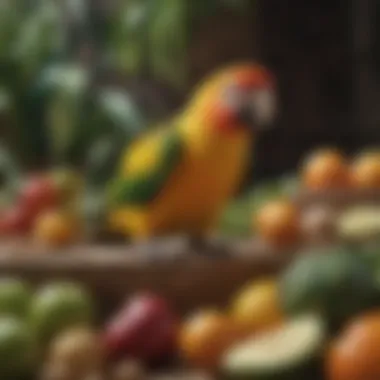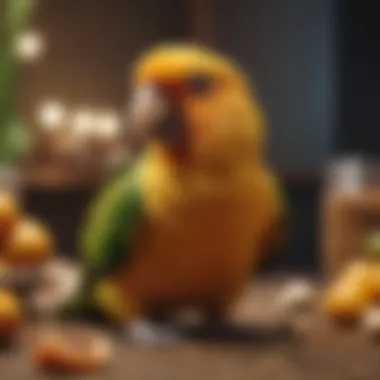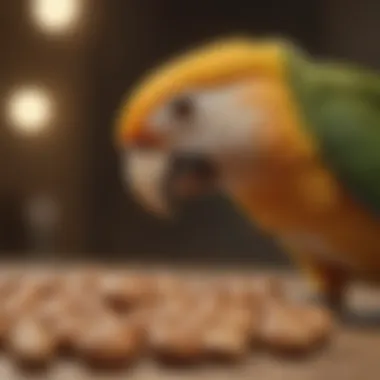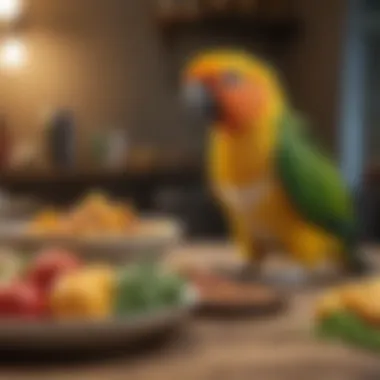Caique Parrot Food: Essential Nutrition for Optimal Health


Intro
Caique parrots are vibrant and intelligent birds known for their playful personalities. Understanding their nutritional needs is vital for the well-being of these creatures. Proper guidance on what to feed your Caique can positively impact their health and longevity. This article will delve into comprehensive nutritional guidelines tailored specifically for Caiques, including the appropriate food sources, essential nutrients, and effective feeding strategies.
Understanding Your Pet
Pet Behavior Basics
Caique parrots exhibit a unique combination of behaviors that can be both entertaining and challenging. They are curious, energetic, and love to explore their environment. Understanding their behavior is crucial in choosing their diet. A balanced diet can help maintain their natural enthusiasm and energy levels.
Common Breed Characteristics
Caiques are medium-sized parrots, usually averaging around 9 to 10 inches in length. They boast a robust and solid build, with bright plumage that includes a mix of greens, yellows, and blacks, depending on the particular species. Available species include the black-headed Caique and the white-bellied Caique. These birds are known for their playful antics and need significant mental stimulation, making it essential to choose food that supports both their physical health and their active lifestyle.
Species-Specific Needs
Caiques have specific dietary needs that differ from other parrot species. They require a well-balanced diet that includes seeds, pellets, and fresh fruits and vegetables. It is also important to note that Caiques can be prone to obesity, so careful attention to their caloric intake is necessary.
Pet Care and Maintenance
Feeding Guidelines
An effective Caique diet typically consists of:
- Pellets: High-quality pellets should make up about 60-70% of their daily intake.
- Seeds: While seeds can be offered as treats, they should not be the primary food source due to high-fat content.
- Fresh Fruits and Vegetables: Incorporating a variety of fruits and vegetables is critical for vitamins and minerals.
Grooming Essentials
Regular grooming is necessary for maintaining your Caique's feathers and skin health. Frequent interactions will also familiarize your bird with handling and grooming, making it a less stressful experience. Consider trimming their nails every few weeks to avoid injury and ensure comfort.
Hygiene Practices
Cleanliness is key to preventing health issues in Caiques. Birdcages should be cleaned weekly, and food and water dishes should be washed daily. Regular cleaning will minimize bacteria buildup, thereby reducing illness risk.
Training and Development
Basic Commands and Skills
Teaching basic commands can create a better bond between you and your Caique. Start with simple commands like “step up” or “come.” Positive reinforcement is foundational for success in training.
Behavioral Training Techniques
Consistent training routines help mitigate behavioral issues. Behavioral problems can arise from boredom or lack of social interaction. engaging the bird through training can help in preventing such issues.
Addressing Common Behavior Issues
Recognizing early signs of behavioral issues is essential. Some Caique parrots may develop habits such as excessive screeching or feather plucking. Consulting with avian veterinarians or bird behaviorists can provide strategies to address these problems effectively.
Health and Wellness
Routine Vet Check-ups
Regular veterinary check-ups play a critical role in the health of Caique parrots. Ideally, visits should occur at least once a year for overall assessments and monitoring of health.
Vaccination Needs
Discuss vaccination options with an avian veterinarian, as some vaccinations may be essential to protect against common avian diseases.
Recognizing Signs of Illness
Pet owners should be vigilant for any signs indicating poor health, including changes in eating habits, lethargy, or feather loss. Early detection can lead to better outcomes in treatment.
Enrichment and Activities


Indoor vs.
Outdoor Activities
Providing a variety of activities is important for a Caique's mental health. Indoor play in a safe environment promotes engagement. For outdoor activities, ensure safe surroundings to minimize risks.
Interactive Toys and Games
Caiques benefit from engaging toys that mimic foraging techniques. Toys that require manipulation or guesswork keep these intelligent birds stimulated.
Socialization Opportunities
Socialization is equally important. Caiques thrive in environments where they can interact with their human families or other birds. Ensuring regular interaction can lead to happier and healthier pets.
Proper nutrition coupled with love and engagement is key to having a well-adjusted Caique parrot.
Through understanding their behavior and meeting their nutritional needs, pet owners can significantly enhance the quality of life for their Caique parrots.
Understanding Caique Parrots
Caique parrots are known for their playful nature and vibrant colors, making them popular choices for pet owners. Understanding the species is crucial for providing the best care, particularly when it comes to their nutritional needs. Knowing their natural behaviors and dietary habits helps in selecting a suitable diet that caters to their specific requirements. This section explores the essentials about Caique parrots, emphasizing the importance of appropriate nutrition to enhance their health and longevity.
Overview of the Species
Caique parrots belong to the family Psittacidae and are native to the tropical forests of South America. There are several species, including the Black-headed Caique and the White-bellied Caique. These birds are known for their energetic personalities and striking plumage. They typically measure around 10 to 12 inches in length, with a stout body and a strong beak.
Caique parrots are social creatures that thrive on interaction. Their curious nature leads them to engage in playful behaviors that require mental and physical stimulation. Understanding the characteristics of Caique parrots is essential in providing an enriching environment, including the right types of food to support their active lifestyles.
Typical Dietary Habits in the Wild
In their natural habitat, Caique parrots have a diverse diet that mainly consists of fruits, seeds, nuts, and flowers. Their food choices reflect the rich biodiversity of the forests they inhabit. Fruits contribute essential vitamins and moisture, while seeds and nuts provide fats and proteins necessary for energy.
Wild Caique parrots also consume flowers and their nectar, offering them additional nutrients. These foods are gathered in a foraging style, allowing them to utilize their natural instincts and maintain their mental agility.
The typical dietary habits of Caiques highlight the necessity for a varied diet in captivity. This understanding informs pet owners about the importance of replicating this diversity in the meals they offer, ensuring a balanced intake of essential nutrients.
Understanding what Caique parrots eat in the wild can greatly inform how to feed them in captivity for optimal health.
Essential Nutritional Needs
Understanding the essential nutritional needs of Caique parrots is fundamental for any pet owner. These lively birds require a well-rounded diet to maintain their health and vitality. Proper nutrition not only supports their physical well-being but also enhances their behavior and longevity. Ignoring these needs can lead to deficiencies, affecting their quality of life.
Macronutrients: Proteins, Fats, and Carbohydrates
Caique parrots, like all avian species, need macronutrients to thrive. Each type plays a unique role in their overall health.
Proteins are crucial as they aid in growth, repair, and maintenance of tissues. Birds require high-quality protein sources, such as legumes, grains, and some seeds. Proper protein sources can help in the development of robust muscles, feathers, and overall body functions.
Fats are also significant but should come from healthy sources. These provide energy and support cell formation. Avocado and seeds like sunflower seeds, while they are high in fat content, must be given in moderation to avoid obesity.
Carbohydrates, found in grains and fruits, serve as a quick energy source. However, not all carbohydrates are created equal. Opting for complex carbohydrates will ensure a steady energy release throughout the day. This can include oats, whole grains, and a variety of fruits that are safe for parrots.
In summary, a balanced combination of proteins, fats, and carbohydrates can lead to happier and healthier Caique parrots.
Micronutrients: Vitamins and Minerals
Micronutrients may not be needed in large quantities, but they are vital for the proper functioning of your Caique's body. Vitamins and minerals support various bodily processes that ensure overall health.
Vitamins play key roles in bodily functions. For instance, Vitamin A is essential for vision and can be sourced from dark leafy greens and orange vegetables. Vitamin D helps in calcium absorption, crucial for maintaining strong bones.
Minerals such as calcium and phosphorus are important in maintaining healthy bones and feather development. Unfortunately, deficiencies can lead to serious health concerns. Foods high in calcium include dark leafy greens and some fortified pellets.
Incorporating a variety of fresh fruits and vegetables not only provides the required vitamins and minerals but also adds diversity to their diet.


It is crucial to monitor the balance of these nutrients to promote optimum health for Caique parrots.
Types of Caique Parrot Food
Understanding the types of food available for Caique parrots is crucial for ensuring their health and well-being. Caiques are active, intelligent birds that require a variety of nutrients to thrive. This section will delve into several food options, including commercial pelleted diets, seed mixes, fresh fruits, vegetables, and nuts. Each food category has its benefits and considerations that pet owners need to be aware of to provide the best diet for their companion birds.
Commercial Pelleted Diets
Commercial pelleted diets are often seen as a staple food for Caique parrots. They are designed to meet the nutritional needs of birds, providing a balanced blend of proteins, fats, carbohydrates, vitamins, and minerals. This option has several advantages.
- Nutritional Balance: These diets offer a consistent and balanced nutrient profile, reducing the risk of deficiencies.
- Convenience: Pelleted diets are easy to store and serve, making mealtime simpler for pet owners.
- Reduced Waste: Unlike seed mixes, pellets produce less mess, as they are less likely to be picked apart.
However, it is essential to choose high-quality brands, as some cheaper options may contain fillers that lack nutritional value. Brands like Harrison's Bird Foods and Kaytee offer more premium choices that have a good reputation among avian experts.
Seed Mixes: Pros and Cons
Seed mixes are another option but come with mixed reviews. While they can be appealing to Caique parrots due to their variety of flavors and textures, they are often not nutritionally complete. Here are some points to consider:
Pros
- Variety: Different seeds can provide different tastes and encourage foraging behavior.
- Palatability: Many birds enjoy seeds and may be more inclined to eat them over pellets.
Cons
- Nutritional Imbalance: Relying too heavily on seeds can lead to deficiencies, as many seed mixes are high in fat and lack essential nutrients.
- Selective Eating: Birds may pick their favorite seeds, ignoring others that provide necessary nutrition.
In general, it's advisable to use seed mixes as a supplement rather than the primary diet, balancing them with other food types.
Fresh Fruits and Vegetables
Incorporating fresh fruits and vegetables into a Caique's diet is vital. These foods provide essential vitamins, minerals, and hydration. Popular options include:
- Fruits: Apples, bananas, and berries are generally well-received by Caiques.
- Vegetables: Leafy greens like kale, carrots, and bell peppers offer nutritional variety.
Introducing fresh foods can encourage natural foraging behavior and help prevent boredom. It's important to wash all fruits and veggies thoroughly and rotate different types to provide a balanced intake of nutrients.
Nuts and Other Treats
Nuts can serve as a great treat for Caique parrots when given in moderation. They are high in protein and healthy fats. However, certain precautions are necessary:
- Portion Control: Due to their high fat content, nuts should not make up a large part of the diet. A small handful a few times a week is sufficient.
- Choice of Nuts: Almonds, walnuts, and pistachios are good options. Avoid salted or sweetened varieties.
Beyond nuts, other treats like cooked whole grains or specific bird-safe snacks can add variety to your bird's diet, promoting engagement and interaction. Always ensure that treats do not exceed 10% of your Caique's overall intake.
It's essential to remember that a diverse diet is key to maintaining the health and well-being of your Caique parrot. Regularly assessing and adjusting their food can improve their quality of life.
Feeding Strategies
Feeding strategies are pivotal in providing effective care for Caique parrots. A well-considered approach can greatly influence their overall health and longevity. Understanding the specifics of feeding strategies helps pet owners ensure that their parrots receive a balanced diet suited to their unique needs. This section explores the essentials that will lead to healthier feeding habits.
Establishing a Feeding Schedule
Setting a regular feeding schedule is crucial for Caique parrots. These birds thrive on routine, and a consistent feeding time can help them feel secure. Establishing fixed mealtime routines can also aid in monitoring their appetite and overall health. It is advisable to feed them twice a day, ideally in the morning and early evening. This routine can simulate their natural habits, aligning with their most active periods.
Benefits of a Feeding Schedule
- Predictable Routine: Caique parrots are intelligent and can learn routines quickly. A regular schedule helps them anticipate feeding times, reducing anxiety.
- Health Monitoring: Regular feeding times allow owners to track daily food intake, identifying any changes in eating behavior, which may indicate health issues.
- Reduced Waste: Establishing a schedule can help manage portion sizes better, leading to less food waste.
Portion Control for Optimal Health
Portion control is essential for maintaining the health of Caique parrots. Overfeeding can lead to obesity, while underfeeding can result in malnutrition. It is vital to base their portions on age, activity level, and overall health. Monitoring daily food intake ensures that Caique parrots remain energetic and healthy.
Guidelines for Portion Control


- Balanced Mix: Ensure a mix of pellets, seeds, fruits, and vegetables. A general guideline is about 1/4 cup of pellets daily, complemented by 1/2 cup of fresh produce.
- Adjust According to Needs: Young Caiques may need more food due to higher activity levels. Adjust portions according to their specific needs.
- Use Measuring Tools: A small measuring cup can help maintain consistent feeding amounts, avoiding over or underfeeding.
Gradually Introducing New Foods
Introducing new foods to Caique parrots should be done gradually. This process reduces the chances of gastrointestinal distress and encourages birds to be curious about a balanced diet. Gradual changes encourage acceptance of various food types, ensuring a diverse intake of nutrients.
Steps for Introducing New Foods
- Start Small: Begin with small amounts of the new food item mixed with their usual diet.
- Monitor Reactions: Observe for any adverse reactions or preferences. Caique parrots can be picky eaters; monitoring will help understand their likes and dislikes.
- Consistency is Key: Offer the new food for several days. Sometimes it takes multiple exposures for a parrot to accept a food item.
- Diversify: Once they accept a new item, gradually introduce other foods to expand their palette.
A successful diet for Caique parrots relies on consistency and variety. Owners should strive to provide nourishment that meets their birds' individual needs while encouraging a well-rounded diet.
Maintaining an organized feeding strategy is essential for the well-being of Caique parrots. By establishing a schedule, paying attention to portion sizes, and wisely introducing new foods, owners can foster a happy, healthy life for their avian companions.
Common Dietary Mistakes
Common dietary mistakes can significantly impact the health and well-being of Caique parrots. Being aware of these pitfalls is crucial for every responsible pet owner. A balanced diet allows these birds to thrive and maintain their vibrant energy levels. Identifying and addressing dietary errors not only enhances their nutrition but also strengthens the bond between the owner and the pet. Below, we delve into specific mistakes that are commonly made, the reasons behind them, and how to correct them.
Over-reliance on Seeds and Nuts
Many Caique parrot owners mistakenly rely heavily on seeds and nuts as a primary food source. While these foods are palatable and often enjoyed by birds, they tend to be high in fat and low in essential nutrients. Excessive consumption of fatty foods can lead to obesity, which poses significant health risks, including heart disease and reduced lifespan.
It's important to offer a varied diet that includes other nutritional components. Seeds and nuts can be given as treats rather than the mainstay of the diet. Choosing a pelleted diet specially formulated for Caique parrots can help balance their intake. Some health-conscious owners choose to limit the amounts of high-fat nuts, such as peanuts, and instead offer healthier options like walnuts or almonds, which contain beneficial nutrients while being lower in fat.
Ignoring Fresh Food Options
Another common mistake is neglecting fresh food options. Caique parrots thrive on a diverse diet that includes fresh fruits and vegetables. Fresh foods provide essential vitamins and minerals that are often lacking in commercial diets. Ignoring these options can lead to nutritional deficiencies over time.
Introducing a variety of fresh produce is beneficial. Leafy greens like kale, carrots, and bell peppers are particularly good choices. These foods can enhance the diet's nutritional value and also keep the parrot mentally stimulated. It is advisable to wash fruits and vegetables thoroughly and to chop them into manageable sizes for easy consumption. Keeping it simple and removing rinds or seeds when necessary ensure safer eating habits.
Inadequate Water Intake
Inadequate water intake is often an overlooked aspect of Caique parrot care. Birds can become dehydrated if fresh water is not consistently available. Regular hydration is crucial for various bodily functions, including digestion and metabolism. Parrots typically do not drink as much water as one would expect, relying on high-moisture foods as part of their fluid intake.
It is best practice to provide fresh water in a clean bowl daily and monitor the water intake. Ensure that the water container is easily accessible and not obstructed by their toys or perches. Consider observing your parrot's habits, noting if they frequently drink during specific times of the day. Adjusting the environment, such as avoiding excessive temperatures, can also aid in managing their hydration needs.
Focusing on a balanced diet while avoiding common dietary mistakes can ensure your Caique parrot remains healthy and lively. Remember to consult with avian veterinarians for tailored advice and health checks.
Monitoring Caique Parrot Health through Diet
Understanding how diet impacts the health of Caique parrots is paramount. Nutritional deficiencies or imbalances can lead to serious health problems over time. Regular monitoring allows pet owners to detect these issues early and make necessary adjustments. This section emphasizes key aspects of monitoring, including specific signs of nutritional deficiency and the importance of regular veterinary check-ups.
Signs of Nutritional Deficiency
Recognizing signs of nutritional deficiency in Caique parrots is crucial for timely intervention. Here are some common indicators that your parrot may be lacking essential nutrients:
- Feather Problems: Dull or disheveled feathers may indicate a lack of fatty acids or protein.
- Weight Fluctuations: Sudden weight loss or gain can signal inadequate nutrition.
- Behavioral Changes: A Caique that is more irritable or lethargic could be suffering from a vitamin or mineral deficiency.
- Digestive Issues: Signs such as diarrhea or bloating could suggest problems with diet.
It's essential for pet owners to observe these signs closely. Maintaining a log of their parrot's health and behavior can help identify patterns that may indicate dietary issues. Seeking veterinary advice at the first signs of concern can prevent further complications.
Important: Always address potential health issues with a qualified avian veterinarian for accurate diagnosis and treatment options.
Regular Veterinary Check-ups
Regular veterinary check-ups play a pivotal role in maintaining your Caique parrot's health. These visits allow for comprehensive evaluations that can spot hidden dietary issues before they become severe.
During check-ups, veterinarians can:
- Assess overall health, including weight, feather quality, and energy levels.
- Provide advice on dietary adjustments based on the parrot's age, activity level, and health status.
- Conduct blood tests to check for nutritional deficiencies or other health concerns.
It is recommended to arrange veterinary check-ups at least once a year, possibly more often for older birds or those with known health issues. Keeping a consistent routine helps in maintaining your parrot's well-being and longevity.
The End
The conclusion serves as a critical component of this article on Caique parrot nutrition. Summarizing the key insights from the discussions provides pet owners with clarity regarding dietary approaches for their feathered companions. With a well-rounded understanding of Caique parrots’ specific nutritional needs, caregivers can create tailored meal plans that promote overall health and vitality.
Creating Balanced Diet Plans for Your Caique is essential for several reasons. First, these birds require varied nutrition, similar to what they would find in their natural habitat. Their diet should consist of a range of elements, including commercial pellets, freeze-dried or fresh fruits, vegetables, and appropriate nuts. This variety ensures that your Caique receives necessary macronutrients and micronutrients.
When planning meals, it is crucial to pay attention to the proportions of each food type included. Caiques benefit from protein sources, healthy fats, and carbohydrates. While pellets should form the backbone of their diet, fresh produce adds necessary vitamins and minerals.







